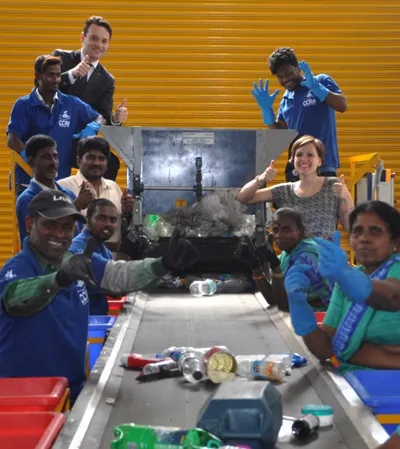Dutch social enterprise Sweepsmart is helping Bengaluru’s municipality to process waste better
SweepSmart links municipalities that need a waste solution with informal recycling sector entrepreneurs by setting up a professional waste management system.
Be it the streets in a village or roads in the city, across India, they’re all littered with garbage. With more than three million truckloads of waste dumped every day, we’re staring at one of the largest environmental and health catastrophes of our time: landfills.
Enter Netherlands-based social enterprise SweepSmart, which offers professional waste solutions based on European waste management principles tailored to low income countries, including local Bottom of Pyramid entrepreneurs.
It all began when Dutch national Silvia de Vaan visited a landfill in Ahmedabad. She saw people living and working in that mountain of waste, and decided that she wanted to do something about it. Silvia, who was then working for The Boston Consulting Group, reached out to Niels van den Hoek, who was with Van Gansewinkel Group, a leading European waste management company. Silvia had known Niels at university, and she was keen to develop a smart inclusive waste management solution for India.
Discovery mission
After winning a grant prize in Europe for their project, SweepSmart started their discovery mission in India in 2015.
In 2016, they started their pilot and now have grown to 3 centres. By the end of the pilot, the handling capacity went up from 3-4 tonnes/day (from 1-1.5 tonnes/day during the pilot), which resulted in higher profit due to increased volume.

SweepSmart used European waste management and business knowledge to set up a professional and efficient waste management system by involving waste pickers organisations. The startup designs and implements the system, delivers the IT and hardware, and takes care of operational and financial management.
SweepSmart has recently closed a deal with Bengaluru’s municipal body, BBMP, to run 10 more dry waste collection centres.
SweepSmart links municipalities that need a waste solution with informal recycling sector entrepreneurs by ensuring a professional waste management system. SweepSmart’s smart waste centres collect and segregate waste from households and companies. The centres have smart operations and data management based on optimised hardware, building, processes, training, and a smart dashboard. Their centres use a conveyor belt, their own design, and a baler for compacting. The conveyor belt is made for small centres and is used by waste pickers. SweepSmart works with Hasiru Dala, a local waste picker collective.
The waste system runs on selling materials and energy, and a collection fee. SweepSmart’s business model is defined on project-by-project basis, starting with Design, Build, Implement and Transfer projects, and expanding to longer-term involvement like auditing, system manager, or operator.
“We tripled capacity, increased recycling, and drastically improved hygiene and ergonomics at 3 pilot centres in Bangalore. This way, we clean the streets, increase recycling, reduce landfills, and give waste pickers a job to be proud of,” Neils says.
In the future
The team has a target of growing to 380 centres in 5 years, translating to a market share of 6-9 percent. They also want to expand their product portfolio and grow to broader geographies within and outside India.
Business intelligence publication India Briefing pegs India’s waste management sector at US$13.62 billion in 2025, with an annual growth rate of 7.17 percent. Most Indian cities suffer from poor handling of waste, with landfills and ground pollution having a hazardous effect on the environment.
The founders of SweepSmart saw a market for scalable, sustainable waste processing in India and other developing countries, and their successful pilots and expansion show promise.







